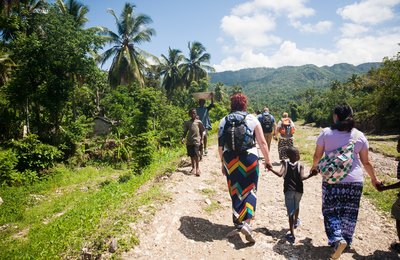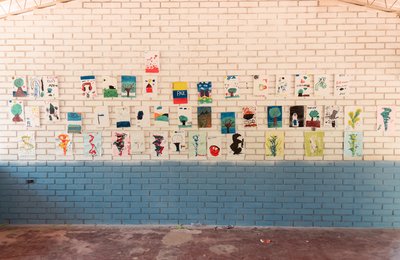SHEILD (Social, Humanitarian, Economical Intervention for Local Development) was founded in September 2006 with the goal of helping the Lebanese people affected by the conflict between Lebanon and Israel, including internally displaced people (IDs) in the most vulnerable categories, such as women and children, the elderly and mine victims. It has established a research unit to document its activism, collect data and analyze it, to add an academic dimension to its work.

SHEILD’s mission is to help those who suffered, and are still suffering, from war and from the absence of sufficient government services in Lebanon in some fields such as health, social care and protection; and to ensure social justice and human rights for all.
It does this through direct assistance and community-based interventions to enhance human rights, social awareness, economic conditions and protection for all. It uses a participatory approach in all its work, involving local stakeholders and authorities in a system of coordination, to assess needs and implement programs accordingly. It has managed to play an important coordination and interactive role with almost all community stakeholders in South Lebanon. This has enabled SHEILD to enter deep into the society and unite the efforts of different entities for the best interest of the population. The association is also active in Palestinian camps in Lebanon, and in the relief of Syrian refugees, providing health, hygiene, family planning and child care; as well legal assistance and raising awareness.
Bringing people together for common development
Much of SHIELD’s work is linked to peacebuilding and national reconciliation. It has brought together people with different religious and confessional backgrounds in order to develop joint projects to assist the improvement of living conditions for everyone.

According to one of SHEILD’s project managers, in many cases people who would not usually greet each other end up working together on common projects. The association is aware that the potential for conflict in field projects is still very high. Hence a principle idea is to attract people from different backgrounds through offering them funds for common projects, enabling them to work together with experts. From the development of a project idea all the way to implementation, people from different backgrounds have to work together. In doing so, according to the experience of SHEILD, tensions and prejudices among the various groups are reduced. The projects are therefore conducive to lasting peace among the different parts of Lebanese society and refugees.
Working with young people
SHIELD believes that working with children and young people is of great importance to contributing to future peace. In order to give the youth an opportunity to mingle and to get to know each other, youth community centers have been established, in which they are able to engage in activities such as sports, arts, and music. To provide children and teenagers with additional incentives to join, famous social figures are often invited to come as guests to the centers. In addition, the young people are involved in the decision-making process as to which prominent person shall be invited.
Access to justice
SHEILD’s overarching goals are to solve the problems of the most vulnerable groups through capacity building and the provision of income activities. Thereby SHEILD aims to be an integral part of people’s daily struggle and hence follows an ‘open door policy’, meaning that people can walk into an office at any time and be heard.
In working with the most vulnerable groups, SHEILD considers it is vital to provide everybody with access to justice. By carrying out this work, the organisation cooperates closely with stakeholders in this field and has four judges assisting in achieving this goal. The idea is to prevent future conflict driven by injustice, something which has led to people taking justice into their own hands in the past, deepening conflict.
Since SHEILD is cooperating and working closely with stakeholders at the highest level in implementing projects, its work also indirectly leads to the promotion of high-level peace. According to SHIELD, its work often involves the participation of more than one government ministry. Therefore, it is possible that the different ministries involved are not on good terms, but through the necessity of cooperation, are forced to engage with each other. This maintains a positive working relationship between them and in turn, often leads to decreasing tensions among them.
The working relationship between different ministries in Lebanon has also lead to an increased visibility of these government institutions, of which the population in the South is either not even aware of, or has a lack of trust in.
By leading to their increased presence and visibility in the south of the country, SHEILD is therefore restoring the vital relationship between these institutions and the population. This is particularly important, as the lack of efficient governmental presence has in the past made it easy for different conflicting interest groups to exploit vulnerable people’s lack of knowledge or trust in them for their own interests and goals.
And because imprisonment does not abolish the principle of freedom but suspends it temporarily, SHEILD decided to protect rights of prisoners and empower them and their families as society normally tends to marginalize them after they serve their terms. Women whose husbands are imprisoned are empowered, and their children supported.
The Syrian crisis
SHEILD was started to serve internally displaced, thus it has a big expertise in refugees' issues and needs, especially that it was an emergency unit. As a local NGO from the south of Lebanon, SHEILD has witnessed firsthand how the influx of Syrian refugees has impacted the local community and the burden it has placed on infrastructure, livelihoods and social cohesion. To reduce tensions, including sectarian ones, and ensure that Lebanese host communities are receptive and willing to absorb the influx of refugees, it works on post-conflict community needs such as medical services, livelihood support and the protection of natural resources, in cooperation with the UNHCR.
Since 2013, it also provides, with the help of international partners, vocational training, food coupons and blankets for refugees, and is helping refugees find proper shelters and housing as well as work and education where possible.





